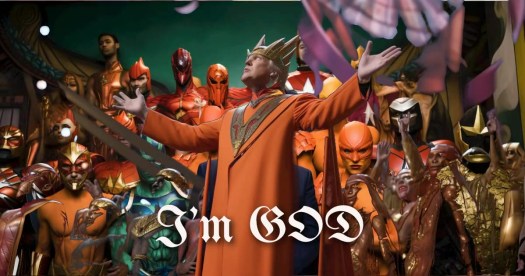
We are ploughing ahead in this series. If you want to understand why this series is call the Marvelization of Man, then skip back to blog 1: here.
Long story short, if there are going to be Marvelous Men, there are also going to be ordinary men, awful men, and god awful terrible men. And this is what we are really exploring, the underside of Marvelous.
So, here we go, taking a deep dive into the workings of the most disgusting, vile, horrid creatures to be found on planet Earth: The Totalitarian Leader!
What follows is from Joost Meerloo’s book, Rape of the Mind, published in 1956. To read more about Joost, backtrack to this blog, here.
The Totalitarian Leader
— Page 79, Rape of the Mind by Joost Meerloo
The leaders of Totalitaria are the strangest men in the state. These men are, like all other men, unique in their mental structure, and consequently we cannot make any blanket psychiatric diagnosis of the mental illness which motivates their behaviour.
But we can make some generalizations which will help us toward some understanding of the totalitarian leader. Obviously, for example, he suffers from an overwhelming need to control other human beings and to exert unlimited power, and this in itself is a psychological aberration, often rooted in deep-seated feelings of anxiety, humiliation, and inferiority. The ideologies such men propound are only used as tactical and strategical devices through which they hope to reach their final goal of complete domination over other men. This domination may help them compensate for pathological fears and feelings of unworthiness, as we can conclude from the psychological study of some modern dictators.
Fortunately, we do not have to rely on a purely hypothetical picture of the psychopathology of the totalitarian dictator. Dr. G. M. Gilbert, who studied some of the leaders of Nazi Germany during the Nuremberg trials, has given us a useful insight into their twisted minds, useful especially because it reveals to us something about the mutual interaction between the totalitarian leader and those who want to be led by him.
Hitler's suicide made a clinical investigation of his character structure impossible, but Dr. Gilbert heard many eyewitness reports of Hitler's behaviour from his friends and collaborators, and these present a fantastic picture of Nazism's prime mover. Hitler was known among his intimates as the carpet-eater, because he often threw himself on the floor in a kicking and screaming fit like an epileptic rage. From such reports, Dr. Gilbert was able to deduce something about the roots of the pathological behaviour displayed by this morbid "genius."
Hitler's paranoid hostility against the Jew was partly related to his unresolved parental conflicts; the Jews probably symbolized for him the hated drunken father who mistreated Hitler and his mother when the future Fuhrer was still a child. Hitler's obsessive thinking, his furious fanaticism, his insistence on maintaining the purity of "Aryan blood," and his ultimate mania to destroy himself and the world were obviously the results of a sick psyche.

As early as 1923, nearly ten years before he seized power, Hitler was convinced that he would one day rule the world, and he spent time designing monuments of victory, eternalizing his glory, to be erected all over the European continent when the day of victory arrived. This delusional preoccupation continued until the end of his life; in the midst of the war he created, which led him to defeat and death, Hitler continued revising and improving his architectural plans.
Nazi dictator Number Two, Hermann Goering, who committed suicide to escape the hangman, had a different psychological structure. His pathologically aggressive drivers were encouraged by the archaic military tradition of the German Junker class, to which his family belonged. From early childhood he had been compulsively and overtly aggressive. He was an autocratic and a corrupt cynic, grasping the Nazi-created opportunity to achieve purely personal gain. His contempt for the "common people" was unbounded; this was a man who had literally no sense of moral values.
Quite different again was Rudolf Hess, the man of passive yet fanatical doglike devotion, living, as it were, by proxy through the mind of his Fuhrer. His inner mental weakness made it easier for him to live through means of a proxy than through his own personality, and drove him to become the shadow of a seemingly strong man, from whom he could borrow strength. The Nazi ideology have this frustrated boy the illusion of blood identification with the glorious German race. After his wild flight to England, Hess showed obvious psychotic traits; his delusions of persecution, hysterical attacks, and periods of amnesia are among the well-known clinical symptoms of schizophrenia.
Still another type was Hans Frank, the devil's advocate, the prototype of the overambitious latent homosexual, easily seduced into political adventure, even when this was in conflict with the remnants of his conscience. For unlike Goering, Frank was capable of distinguishing between right and wrong.
Dr. Gilbert also tells us something about General Wilhelm Keitel, Hitler's Chief of Staff, who became the submissive, automatic mouthpiece of the Fuhrer, mixing military honor and personal ambition in the service of his own unimportance.
Of a different quality is the S.S. Colonel, Hoess, the murderer of millions in the concentration camp of Auschwitz. A pathological character structure is obvious in this case. All his life, Hoess had been a lonely, withdrawn, schizoid personality, without any conscience, wallowing in his own hostile and destructive fantasies. Alone and bereft of human attachments, he was intuitively sought out by Himmler for this most savage of all the Nazi jobs. He was a useful instrument for the committing of the most bestial deeds.
Unfortunately, we have no clear psychiatric picture yet of the Russian dictator Stalin. There have been several reports that during the last years of his life he had a tremendous persecution phobia and lived in constant terror that he would become the victim of his own purges.
Psychological analysis of these men shows clearly that a pathological culture -- a mad world - can be built by certain impressive psychoneurotic types. The venal political figures need not even comprehend the social and political consequences of their behaviour. They are compelled not by ideological belief, no matter how much they may rationalize to convince themselves they are, but by the distortions of their own personalities. They are not motivated by their advertised urge to serve their country or mankind, but rather by an overwhelming need and compulsion to satisfy the cravings of their own pathological character structures.
The ideologies they spout are not real goals; they are the cynical devices by which these sick men hope to achieve some personal sense of worth and power. Subtle inner lies seduce them into going from bad to worse. Defensive self-deception, arrested insight, evasion of emotional identification with others, degradation of empathy - the mind has many defense mechanisms with which to blind the conscience.

A clear example of this can be seen in the way the Nazi leaders defended themselves through continuous self-justification and exculpation when they were brought before the bar at the Nuremberg trials. These murderers were aggrieved and hurt by the accusations brought against them; they were the very picture of injured innocence.
Any form of leadership, if unchecked by controls, may gradually turn into dictatorship. Being a leader, carrying great power and responsibility for other people's lives, is a monumental test for the human psyche. The weak leader is the man who cannot meet it, who simply abdicates his responsibility. The dictator is the man who replaces the existing standards of justice and morality by more and more private prestige, by more and more power, and eventually isolates himself more and more from the rest of humanity. His suspicion grows, his isolation grows, and the vicious circle leading to a paranoid attitude begins to develop.
The dictator is not only a sick man, he is also a cruel opportunist. He sees no value in any other person and feels no gratitude for any help he may have received. He is suspicious and dishonest and believes that his personal ends justify any means he may use to achieve them. Peculiarly enough, every tyrant still searches for some self-justification. Without such a soothing device for his own conscience, he cannot live.
His attitude toward other people is manipulative; to him, they are merely tools for the advancement of his own interests. He rejects the conception of doubt, of internal contradictions, of man's inborn ambivalence. He denies the psychological fact that man grows to maturity through groping, through trial and error, through the interplay of contrasting feelings. Because he will not permit himself to grope, to learn through trial and error, the dictator can never become a mature person. But whether he acknowledges them or not, he has internal conflicts, he suffers somewhere from internal confusion. These inner "weaknesses" he tries to repress sternly; if they were to come to the surface, they might interfere with the achievement of his goals. Yet, in the attacks of rage his weakening strength is evident.
It is because the dictator is afraid, albeit unconsciously, of his own internal contradictions, that he is afraid of the same internal contradictions of his fellow men. He must purge and purge, terrorize and terrorize in order to still his own raging inner drives. He must kill every doubter, destroy every person who makes a mistake, imprison everyone who cannot be proved to be utterly single-minded. In Totalitaria, the latent aggression and savagery in man are cultivate by the dictator to such a degree that they can explode into mass criminal actions shown by Hitler's persecution of minorities. Ultimately, the country shows a real pathology, an utter dominance of destructive and self-destructive tendencies.
Archetypal Animations

Feature Archetypal Animation
Images: Midjourney
Music: Trump Chill Covers — Maestro Ziikos — [10] Unstoppable – Trump 3:36

First Archetypal Animation
Images — Midjourney
Music: Mountain of Memory (Remixes) — Emancipator: Dodo – ITO Remix 4:49

Second Archetypal Animation
Images — Midjourney
Music: Make America Great Again — Trump The Don — [1] Make America Great Again 2:17








































































